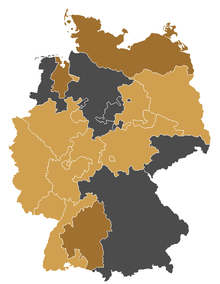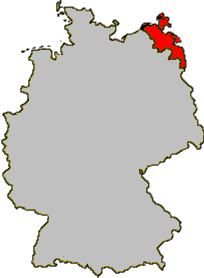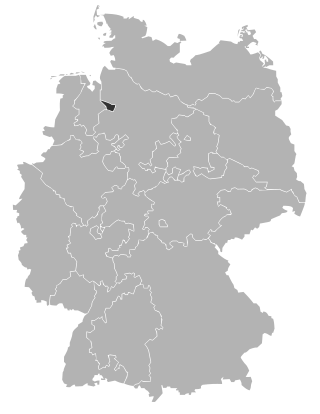
The Union of Evangelical Churches (German: Union Evangelischer Kirchen, UEK) is an organisation of 10 United and 2 Reformed evangelical churches in Germany, which are all member churches of the Protestant Church in Germany.

The Union of Evangelical Churches (German: Union Evangelischer Kirchen, UEK) is an organisation of 10 United and 2 Reformed evangelical churches in Germany, which are all member churches of the Protestant Church in Germany.
Guests are
The UEK was founded on July 1, 2003. The organisation succeeded the former organisation Evangelical Church of the Union (German : Evangelische Kirche der Union, EKU). The seat of the organisation used to be Berlin. For structural reasons, it was moved to the seat of the Protestant Church in Germany (EKD) in Hanover though. On November 9, 2019, Union of Evangelical Churches allowed blessings of same-sex marriages. [1]
The parliament (=Vollkonferenz) of the organisation is an elected group of 47 members, which are elected for six years each term. The 47 members elect a "Präsidium".

The Evangelical Church in Germany, also known as the Protestant Church in Germany, is a federation of twenty Lutheran, Reformed, and United Protestant regional Churches in Germany, collectively encompassing the vast majority of the country's Protestants. In 2022, the EKD had a membership of 19,153,000 members, or 22.7% of the German population. It constitutes one of the largest Protestant bodies in the world. Church offices managing the federation are located in Herrenhausen, Hanover, Lower Saxony. Many of its members consider themselves Lutherans.

The Pomeranian Evangelical Church was a Protestant regional church in the German state of Mecklenburg-Vorpommern, serving the citizens living in Hither Pomerania. The Pomeranian Evangelical Church was based on the teachings brought forward by Martin Luther and other Reformators during the Reformation. It combined Lutheran and Reformed traditions. The seat of the church was Greifswald, the bishop's preaching venue was the former Collegiate Church of St. Nicholas in Greifswald.

A united church, also called a uniting church, is a denomination formed from the merger or other form of church union of two or more different Protestant Christian denominations, a number of which come from separate and distinct denominational orientations or traditions. Multi-denominationalism, or a multi-denominational church or organization, is a congregation or organization that is affiliated with two or more Christian denominations, whether they be part of the same tradition or from separate and distinct traditions.

The Independent Evangelical-Lutheran Church is a confessional Lutheran church body of Germany. It is a member of the European Lutheran Conference and of the International Lutheran Council (ILC). The SELK has about 33,000 members in 174 congregations. The seat of SELK is in Hanover.

The Prussian Union of Churches was a major Protestant church body which emerged in 1817 from a series of decrees by Frederick William III of Prussia that united both Lutheran and Reformed denominations in Prussia. Although not the first of its kind, the Prussian Union was the first to occur in a major German state.

Lutheranism is present on all inhabited continents with an estimated 80 million adherents, out of which 74.2 million are affiliated with the Lutheran World Federation. A major movement that first began the Reformation, it constitutes one of the largest Protestant branches claiming around 80 million out of 920 million Protestants. The Lutheran World Federation brings together the vast majority of Lutherans. Apart from it, there are also other organisations such as the International Lutheran Council and the Confessional Evangelical Lutheran Conference, as well as multiple independent Lutheran denominations.

The Evangelical Lutheran Church in Oldenburg is a Lutheran church in the German state of Lower Saxony.

The Protestant Church in Hesse and Nassau is a United Protestant church body in the German federal states of Hesse and Rhineland-Palatinate. There is no bishop and therefore no cathedral. One of its most prominent churches is Katharinenkirche in Frankfurt am Main.

The Evangelical Church of Bremen is a United Protestant member church of the Protestant Church in Germany in the Free Hanseatic City of Bremen.

The Protestant Church in the Rhineland is a United Protestant church body in parts of the German states of North Rhine-Westphalia, Rhineland-Palatinate, Saarland and Hesse (Wetzlar). This is actually the area covered by the former Prussian Rhine Province until 1920.
The Evangelical Church Berlin-Brandenburg-Silesian Upper Lusatia is a United Protestant church body in the German states of Brandenburg, Berlin and a part of Saxony.

Evangelical Church of the Palatinate is a United Protestant church in parts of the German states of Rhineland-Palatinate and Saarland, endorsing both Lutheran and Calvinist orientations.
Lutheran viewpoints concerning homosexuality are diverse because there is no one worldwide body which represents all Lutherans. The Lutheran World Federation, a worldwide 'communion of churches' and the largest global body of Lutherans, contains member churches on both sides of the issue. However, other Lutherans, including the Confessional Evangelical Lutheran Conference and International Lutheran Council, completely reject homosexuality.

The Communion of Protestant Churches in Europe is a fellowship of over 100 Protestant churches which have signed the Leuenberg Agreement. Together they strive for realizing church communion, especially by cooperation in witness and service to the world. Prior to 2003 the CPCE was known as the "Leuenberg Church Fellowship".
In Germany and Switzerland, a Landeskirche is the church of a region. The term usually refers to Protestant churches, but—in case of Switzerland—also Roman Catholic dioceses. They originated as the national churches of the independent states, States of Germany (Länder) or Cantons of Switzerland , that later unified to form modern Germany or modern Switzerland, respectively.
The Pfarrernotbund was an organisation founded on 21 September 1933 to unite German evangelical theologians, pastors and church office-holders against the introduction of the Aryan paragraph into the 28 Protestant regional church bodies and the Deutsche Evangelische Kirche (DEK) and against the efforts by Reich-bishop Ludwig Müller and the German Christians (DC) since April 1933 to merge the German Protestant churches into one Reich Church that would be Nazi in ideology and entirely lacking any Jewish or Christian origins. As a Christian resistance to National Socialism it was the forerunner of the Confessing Church, founded the following year.
Buß- und Bettag was a public holiday in Germany, and is still a public holiday in Saxony. In Germany, Protestant church bodies of Lutheran, Reformed (Calvinist) and United denominations celebrate a day of repentance and prayer. It is now celebrated on the penultimate Wednesday before the beginning of the Protestant liturgical year on the first Sunday of Advent; in other words, it is the Wednesday that falls between 16 and 22 November. However, it is not a statutory non-working holiday any more, except in the Free State of Saxony. In the Free State of Bavaria, it is a school holiday only.
The German Protestant Church Confederation was a formal federation of 28 regional Protestant churches (Landeskirchen) of Lutheran, Reformed or United Protestant administration or confession. It existed during the Weimar Republic from 1922 until replaced by the German Evangelical Church in 1933. It was a predecessor body to the Protestant Church in Germany.
More than 60 percent of Berlin residents have no registered religious affiliation. As of 2010, at least 30 percent of the population identified with some form of Christianity, approximately 8.1 percent were Muslim, 1 percent were Jewish, and 1 percent belonged to other religions. As of 2022, the number of registered church members has shrunk to 15 percent for EKD Protestants and 9 percent for Catholics.

In Protestant usage, a consistory designates certain ruling bodies in various churches. The meaning and the scope of functions varies strongly, also along the separating lines of the Protestant denominations and church bodies.